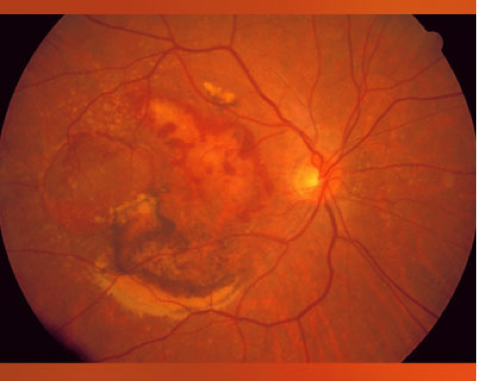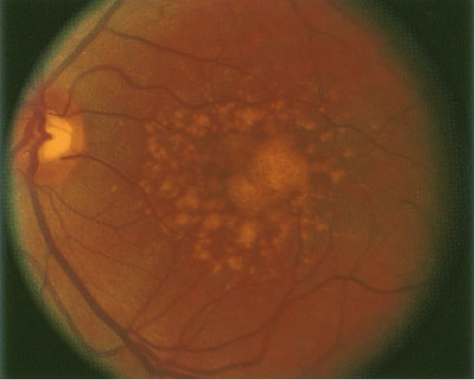Age-related macular degeneration (AMD) is a disease of the retina that causes permanent damage and affects your central vision. You cannot see fine details, whether you are looking at something close or far. But your peripheral (side) vision will still be normal. Many people don’t realize they have AMD until their vision has become very blurry. This is why it is important to have regular visits to an ophthalmologist. He or she can look for early signs of AMD before you have any vision problems.
There are two forms of macular degeneration:
1) Dry Macular degeneration is the most common form of the disease affecting about 80% of those diagnosed. Dry AMD is when parts of the macula get thinner with age and tiny clumps of metabolic waste/lipofuscin grow; these are known as drusen. This causes a slow progressive reduction in your central vision leading to blurry vision and possibly some mild distortion. There is no way to treat dry AMD yet.
2) Wet Macular degeneration is less common but much more serious. Wet AMD is when abnormal blood vessels grow under the retina and leak blood and other fluids that collect under and sometimes within the retina. This causes
You are more likely to develop AMD if you:
• eat a diet high in saturated fat (found in foods like meat, butter, and cheese)
• are overweight
• smoke cigarettes
• are over 50 years old
• have a family history of AMD
• are Caucasian
• have heart disease
• have high cholesterol
The way macular degeneration is diagnosed is through an eye exam with your ophthalmologist. He or she will put dilating eye drop in your eyes to make your pupil larger and this will allow him or her to look through a special lens at the inside of your eye. He or she will be able to notice changes in your retina indicative of macular degeneration.
An Optical coherence tomography (OCT) is another way to evaluate the retina on a microscopic scale. This machine scans the retina and provides very detailed images of the retina and macula. This allows your doctor to see early signs of the disease.
Right now, there is no way to treat the dry form of AMD. However, people with a lot of drusen or serious vision loss might benefit from taking a certain combination of nutritional supplements. A large study found certain patients may slow down their dry AMD by taking these vitamins and minerals daily; known as the AREDS formula. It is important to take note that these vitamins will not cure the disease, they may be able to slow down its progression. This formula consists of:
• Vitamin C (500 mg)
• Vitamin E (400 IU)
• Lutein (10 mg)
• Zeaxanthin (2 mg)
• Zinc (80 mg)
• Copper (2 mg)
Talk with your ophthalmologist about whether nutritional supplements are recommended for you. Here are some topics to discuss:
• Your chance of getting advanced AMD. Studies show that nutritional supplements might help people with early to intermediate AMD who are at risk for developing advanced AMD.
• Eye-healthy foods. Studies show that nutritional supplements alone are not enough to prevent or delay advanced AMD. You also should eat a healthy, balanced diet. This includes dark leafy greens (like spinach and kale) along with yellow, orange and other colorful fruits and vegetables.
• Benefits and risks of nutritional supplements. Taking nutritional supplements can be helpful, but there can be possible health risks. Talk with your ophthalmologist and primary care doctor about how the vitamins and minerals may affect you.
To help treat wet AMD, there are medications called anti-VEGF drugs. Anti-VEGF treatment helps reduce the number of abnormal blood vessels in your retina and help to prevent future growth of these vessels. It also slows any leaking from blood vessels. This medicine is delivered through a thin needle into the eye.
If you have multiple risk factors for macular degeneration or changes in your vision make an appointment with Hollywood Eye Institute for
On social media? Like us on Facebook & Follow us on Instagram
Sources: Photos aao.com
[/fusion_builder_column][/fusion_builder_row][/fusion_builder_container]

